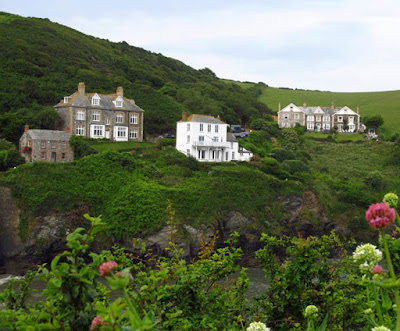What do you do if you're a British airman shot down in WWII France? If you're like RAF pilots Carstairs and Fairfax, you hook up with the French Resistance, and hope they can help you sneak behind enemy lines and return to England. That may mean disguising yourself as onion sellers on bicycles, but better indignity than imprisonment or death.
What do you do if you serve in the military of a country whose leadership has been corrupted? If you're like Colonel Kurt von Strohm and Captain Hans Geering, you get assigned to a quiet town in France. There you can ride out the war, pay lip service to your own country's political agendas, and keep everyone happy without actually having to fight and kill others.
Of course, if you can salt away a few little prizes for your old age, like a priceless painting or a unique Cuckoo clock, so much the better.
What do you do if you're running your own business in wartime, and wish to avoid the fighting by continuing to use your talents and abilities to serve your community? If you're like cafe owner Rene Artois, you serve German officers like Colonel von Strohm and Captain Hans Geering, and do your best to keep them happy. By making friends, they're liable to can help you acquire things like butter, sugar, and paraffin that you need to keep operating and serving everyone.
Oh, and if your beloved serving girls must entertain the German officers in your rooms upstairs with things like pieces of wet celery and an egg whisk...well, you learn to live with it.
What do you do if a French Resistance leader like Michelle Dubois insists that you hide two British airmen in your cafe, along with a forger the Resistance has broken out of prison, until they can smuggle the chaps out of the country? If you're like Rene, with German officers constantly visiting your cafe, you hide them as best you can, whether it be in the chicken coup, or the closet in the room of your bedridden mother-in-law.
What if, as a result of your involvement with the French Resistance, you end up in jail? Well, if your crimes are deemed punishable by death, you hope that your German friends Colonel von Strohm and Captain Geering can supply the firing squad with wooden bullets, which should disintegrate before they hit you.
If you're presumed dead, you can always take on the identity of your previously unknown twin brother. That will allow you to keep running the cafe, and continue your life as before. Of course, the fact that your twin brother was also named Rene will make it easier to get on with things and survive this crazy war.
What do you do if you wish to keep safe and continuing serving others amid a pandemic? If you're like me, you read comics and books, watch fun TV shows like "Allo Allo," and write blogs. Of course, if you visited Lynford Hall, an old manor house in England where the TV series was filmed, you share your memories of that visit with others. And you keep believing that by doing your best to help yourself and others survive, eventually this crazy wartime occupation will end. Then you will be able to reclaim the liberties you once enjoyed, like traveling to such storied places.
Dragon Dave
P.S. "Allo Allo" was created by David Croft and Jeremy Lloyd. David Croft oversaw the production of "Dad's Army," and the duo also created the unforgettable "Are You Being Served?"





















































